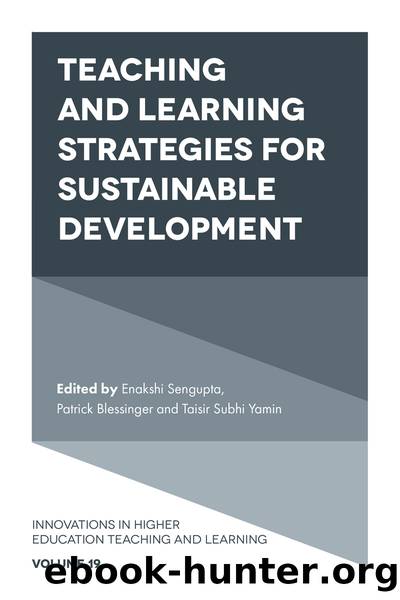Teaching and Learning Strategies for Sustainable Development by Sengupta Enakshi;Blessinger Patrick;Yamin Taisir Subhi;

Author:Sengupta, Enakshi;Blessinger, Patrick;Yamin, Taisir Subhi;
Language: eng
Format: epub
Publisher: Emerald Publishing Limited
Published: 2020-03-13T00:00:00+00:00
Teaching and Learning Strategies for Sustainable Development:
Innovations in Higher Education Teaching and Learning, Volume 19, 107â122
Copyright © 2020 by Emerald Publishing Limited
All rights of reproduction in any form reserved
ISSN: 2055-3641/doi:10.1108/S2055-364120200000019011
CHAPTER 9
INTEGRATING SUSTAINABLE DEVELOPMENT INTO THE POSTGRADUATE CURRICULUM IN THE UK: A MIXED METHOD STUDY
Gavin Melles
ABSTRACT
In the UK, Masters level discipline-specific courses in sustainability integrate modules on the social, economic, and environmental issues of sustainable development. The postgraduate faculty teaching on these courses and the student cohorts enrolling in such courses bring varying attitudes, experiences, and beliefs to the ecological and anthropological discourses and practices about sustainable development. Existing studies of education for sustainable development (ESD) have identified strengths and weaknesses in the knowledge and attitudes of students and faculty although few studies have focused on postgraduate cohorts and fewer still have attempted to compare and contrast students and lecturers. This mixed method case study analyses findings from data collected (2016â2017) from student surveys (n = 121) and semi-structured interviews with faculty (n = 21) recruited from multiple university departments, centers, and programs (n = 12) to identify prevailing anthropocentric and eco-centric ideas and rationales about sustainable development and ESD. Findings suggest a strong orientation to mainstream sustainable development in both groups but analysis identifies reasons for resisting a focus on extremes of âdeep greenâ or âgreen washâ approaches. In addition, prevailing belief in academic neutrality, institutional and disciplinary factors, student pragmatism, and other drivers are highlighted. The study concludes by identifying potential paths from prevailing (experiential) education in sustainable development to more transformational approaches.
Keywords: Education for sustainable development; United Kingdom; postgraduate; faculty; students; strong and weak sustainability; interview; survey
Download
This site does not store any files on its server. We only index and link to content provided by other sites. Please contact the content providers to delete copyright contents if any and email us, we'll remove relevant links or contents immediately.
| Behavioral Disorders | Communicative Disorders |
| Gifted Students | Inclusive Education |
| Learning Disabled | Mentally Disabled |
| Physically Disabled |
The Art of Coaching Workbook by Elena Aguilar(50131)
Trainspotting by Irvine Welsh(21051)
Twilight of the Idols With the Antichrist and Ecce Homo by Friedrich Nietzsche(18312)
Fangirl by Rainbow Rowell(8808)
Periodization Training for Sports by Tudor Bompa(7936)
Change Your Questions, Change Your Life by Marilee Adams(7390)
This Is How You Lose Her by Junot Diaz(6463)
Asking the Right Questions: A Guide to Critical Thinking by M. Neil Browne & Stuart M. Keeley(5370)
Grit by Angela Duckworth(5303)
Red Sparrow by Jason Matthews(5204)
Paper Towns by Green John(4815)
Room 212 by Kate Stewart(4746)
Ken Follett - World without end by Ken Follett(4453)
The Sports Rules Book by Human Kinetics(4087)
Housekeeping by Marilynne Robinson(4075)
Double Down (Diary of a Wimpy Kid Book 11) by Jeff Kinney(3941)
Papillon (English) by Henri Charrière(3924)
The Motorcycle Diaries by Ernesto Che Guevara(3796)
Exercise Technique Manual for Resistance Training by National Strength & Conditioning Association(3791)
